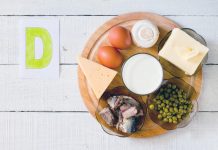Vitamins are needed to your body to work properly.
Our body does not produce vitamins, so they are supplied from outside to your body to function properly.
There are two types of vitamins: fat soluble and water soluble. A, D, E, and K are fat soluble whereas B and C are water soluble.
Fat soluble are stored in your body whereas water soluble are excreted from the body. Fat soluble can be used whenever your body needs whereas water soluble should be replaced regularly.
Vitamin A: It prevents night blindness, helps in growth of body tissues, protects mucous membrane of throat, mouth and nose, and reduces risk of oral and lung cancer. It is found in carrots, apricots, liver, mangoes, spinach, milk, eggs, and sweet potatoes.
Vitamin B: There are group of B vitamins (B1, B2, B3, B5, B6, B12). These are helpful in metabolic activities. These are involved in making red blood cells which carry oxygen throughout the body.
Thiamin or B1 generates energy, stabilizes your appetite, helps in digestion of carbohydrates and helps in normal working of nervous system.
Riboflavin or B2 helps in producing antibodies, red blood cells, necessary for proteins, carbohydrates, and fat metabolism, necessary for good skin and hair, and maintains cell respiration.
Pyridoxine or B6 helps in producing antibodies, it promotes healthy skin, and it is necessary for synthesis and breakdown of amino acids.
Cobalomin or B12 increases your energy, maintains healthy nervous system, and it is necessary for protein, fat and carbohydrate metabolism. It also prevents anemia and helps in formation of red blood cells.
Niacin or B3 reduces your blood pressure and cholesterol and improves circulation. It increases your energy and maintains a healthy digestive system.
The foods which are rich in vitamin B are chicken, egg, fish, milk, oranges, green leafy vegetables, lamb, liver, legumes, whole grains, beans and peas, and yogurt.
Vitamin C: It gives strength to blood vessels, helps in absorption of iron, helps to heal injuries, fractures and scar tissues, necessary for teeth, gums and bones, prevents scurvy, and essential for the synthesis of collagen. It is found in tomatoes, cabbage, broccoli, Brussels sprouts, cauliflower, oranges, strawberries, papaya, cantaloupes and kiwi.
Vitamin D: It improves utilization and absorption of calcium and phosphorus, it maintains stable nervous system and it is also required for teeth and bone formation.
The foods which are rich in vitamin D are fish, fortified milk, egg yolk, and fortified cereals. It is produced by our body when our skin is exposed to sunlight. You can get directly from sun light or you can take the above foods.
Vitamin E: It maintains body tissues, it prevents and dissolves blood clots, and it helps in preventing sterility. It also protects your lungs.
The foods which are rich in vitamin E are egg yolks, nuts, whole grains, papaya, mustard greens, spinach, lettuce and wheat germ.
Vitamin K: It helps in clotting the blood. It is found in carrots, milk, pork, spinach, liver, cabbage, yogurt, green peas, brussels sprouts and avocado.
If you eat these foods, there is no need to take multi vitamins. Some foods are rich in more than one vitamin. You plan a healthy diet and include all the foods which are rich in all the vitamins.










